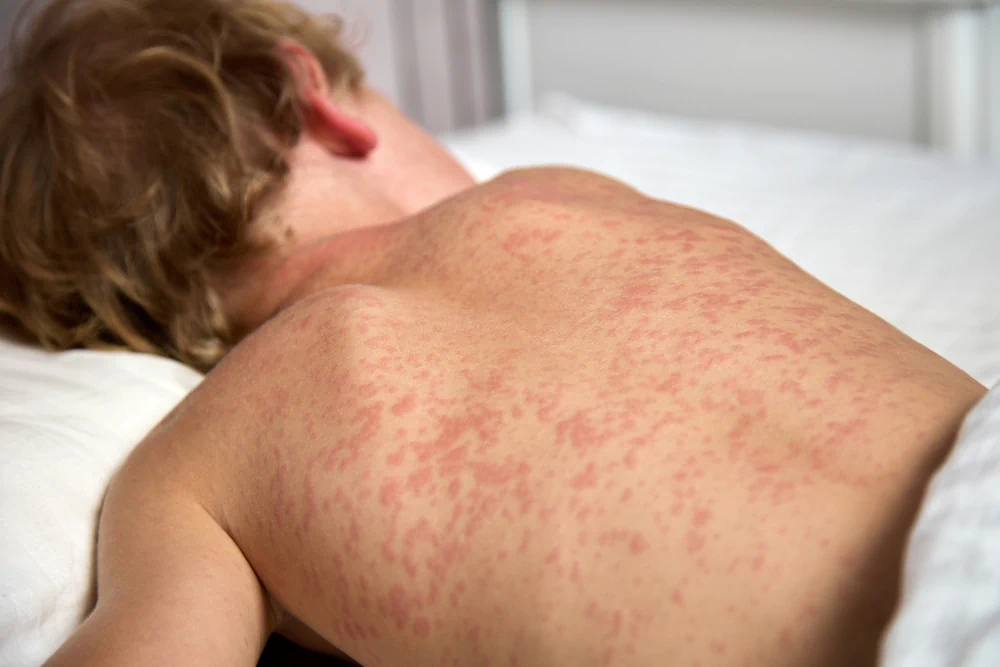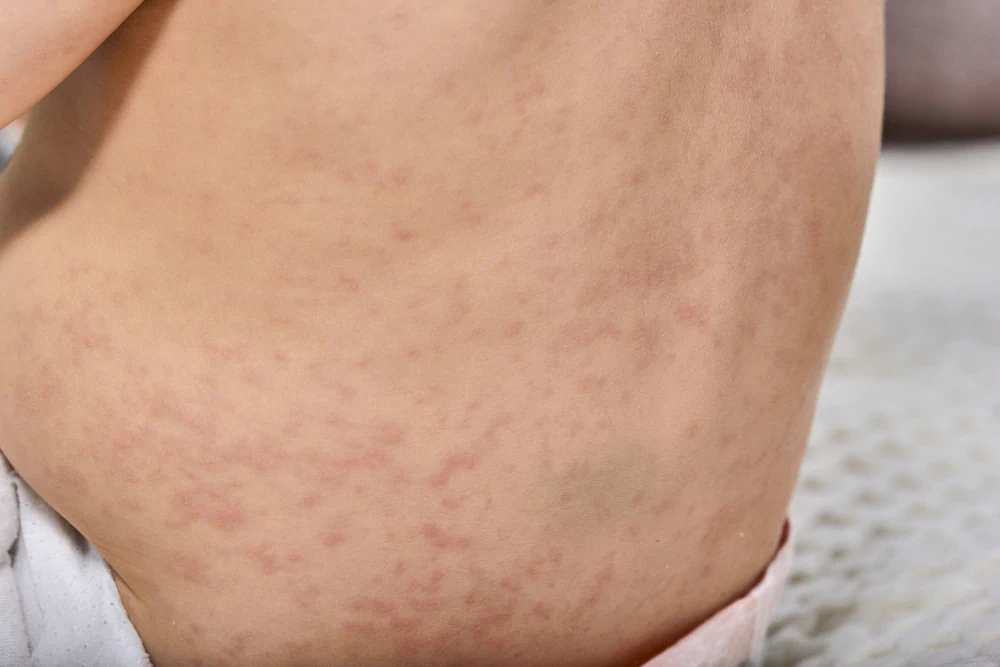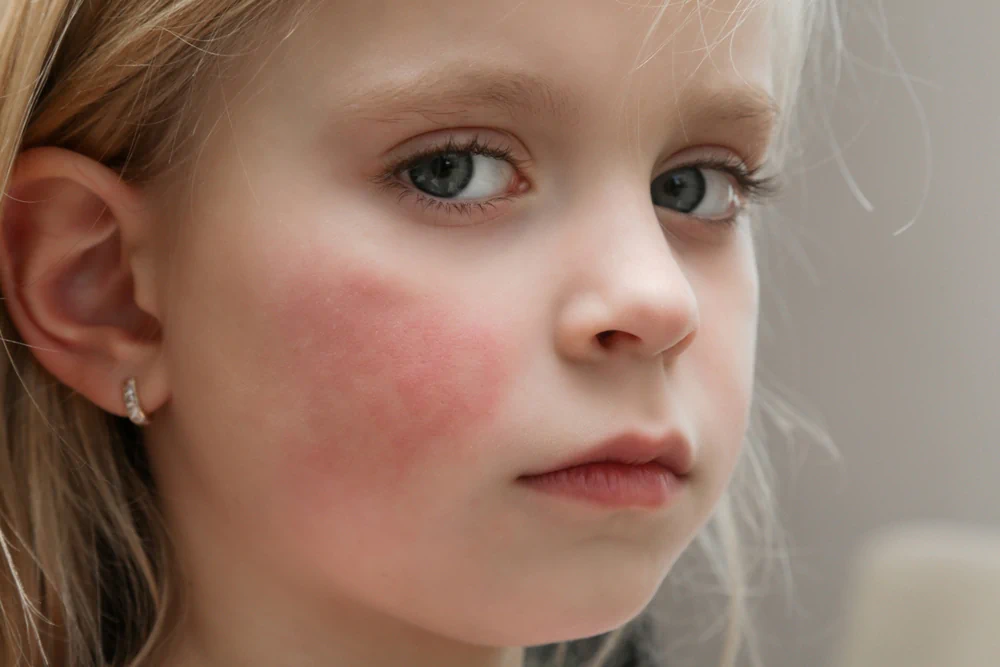Your Guide to Common Childhood Illnesses
Children's Health
•
Oct 12, 2024
Reviewed by:

As parents, we all can understand the concern that comes with a sick child. While a fever in children is usually seen as the main sign of illness, not all serious conditions cause a high temperature. Knowing about common childhood illnesses of all types can help you recognize when your child is sick, and therefore make better choices for their health.
In this article, we will cover several common childhood illnesses, including:
- Roseola infantum
- Common cold
- Respiratory syncytial virus (RSV)
- Fifth disease (erythema infectiosum)
- Croup
- Bronchiolitis
We’ll look at the symptoms, how long these illnesses usually last, and ways to care for them at home. That said, you should always trust your instincts as a parent — if you’re worried about your child’s symptoms, don’t hesitate to get medical help from a freestanding ER near you. Here at Complete Care, we have lower wait times than traditional hospital emergency rooms and can cater to pediatric patients promptly, making us an excellent choice for your child’s care.
1. Roseola infantum virus
Roseola infantum, also known as the “sixth disease,” is a common viral infection that usually affects infants and young children between six months and three years old.
What causes roseola infantum?
Roseola is caused by human herpesvirus 6 (HHV-6) or 7 (HHV-7). These viruses spread through saliva, respiratory droplets, or close personal contact; symptoms typically last for about a week.
Symptoms
Roseola symptoms are typically mild and can include:
- High fever (over 103°F or 39.4°C) lasting 3-5 days
- Fever often ends abruptly, followed by a rash
- Mild upper respiratory symptoms
- Swollen lymph nodes
- Irritability or fussiness
- Decreased appetite
Roseola is contagious, mainly during the fever stage before the rash appears. Children can return to daycare or school once the fever is gone and they feel well, even if the rash is still present.
Because it can be hard to know when to worry about a rash, many parents ask what a roseola rash looks like. The roseola rash appears as small, pink, flat, or slightly raised spots that start on the chest, back, and abdomen and then spread to the neck and arms. It usually lasts 1-2 days and isn’t itchy or uncomfortable.

Care
There is no vaccine for roseola, and you recover from the illness much like you would from a cold by:
- Ensuring plenty of rest and fluids
- Using acetaminophen or ibuprofen to manage fever and discomfort
- Monitoring for signs of dehydration
- Keeping the child comfortable and cool during the fever
While roseola is usually mild, always trust your instincts and consult a healthcare provider if you’re concerned about your child’s symptoms. Seek medical attention immediately if:
- The fever is very high or lasts more than seven days
- The child seems very ill or unusually drowsy
- You notice signs of dehydration (dry mouth, sunken eyes, lack of tears when crying)
- The rash doesn’t fade when pressed or looks bruise-like
2. Common cold
The common cold is an infection caused by various viruses, most frequently rhinoviruses, affecting the nose and throat. These viruses spread through air droplets when someone with the virus coughs, sneezes, or talks, or by touching contaminated surfaces and then touching your face, making them a common sickness in schools.
Symptoms
Cold symptoms usually appear 1-3 days after exposure and can include:
- Runny or stuffy nose
- Sore throat
- Cough
- Congestion
- Slight body aches or a mild headache
- Sneezing
- Low-grade fever
- Generally feeling unwell
Symptoms typically last 7-10 days, though some may linger for up to two weeks.
Care
There’s no cure for the common cold, but you can manage symptoms by:
- Ensuring plenty of rest and fluids
- Using over-the-counter pain relievers for aches and fever
- Using saline nasal drops or spray to relieve congestion
- Running a cool-mist humidifier
- Offering warm liquids to soothe the throat
3. Respiratory syncytial virus (RSV)
Anyone who knows or is a parent of young children has probably heard about one of the most common childhood illnesses — RSV. But what is RSV and how serious is it?
Like roseola, RSV is a viral infection caused by the respiratory syncytial virus that affects most American children by age two. The sickness is highly contagious for between three and eight days and can be spread through saliva, respiratory droplets, or contact with a sick person or an object they’ve touched. RSV tends to spread sometime between late fall and early spring, depending on where you live in the U.S.
For premature babies, young children with heart or lung issues, and those with weak immune systems, RSV is the leading cause of hospitalization in infants under one, and severe cases may require IVs or oxygen. If your child is at risk, your doctor may suggest Palivizumab to help prevent severe symptoms. While there’s no vaccine or cure, symptoms can be managed with rest, fluids, fever reducers, and saline spray.
Symptoms
Symptoms of RSV are almost indistinguishable from those of the common cold and include:
- Runny nose
- Decrease in appetite
- Coughing
- Sneezing
- Fever
- Wheezing
While not as common as respiratory symptoms, some children with RSV may develop a skin rash. When does RSV rash appear? This rash usually shows up 1-2 days after other symptoms, appearing as flat red or purple spots or blotches, often on the chest, back, and face. It’s typically not itchy or painful and fades as symptoms get better.
In severe cases, RSV can lead to bronchiolitis or pneumonia, especially in infants and older adults. Watch out for signs of a caved chest, flared nostrils, or shallow breaths, as this indicates labored breathing.
Care
Most RSV infections go away on their own in a week or two. Care typically involves:
- Managing fever and pain with over-the-counter medications
- Drinking plenty of fluids
- Using saline drops and suctioning for congestion
- Using a cool-mist humidifier
With RSV, swollen lymph nodes are common, especially in the neck area. These swollen glands are a sign that the body is fighting the infection. However, if they are severely swollen and painful and/or are accompanied by a high fever, dehydration, or difficulty breathing, you should seek emergency medical care immediately.
4. Fifth disease (erythema infectiosum)
Fifth disease is an infection caused by parvovirus B19, which is different from the parvo our pets can get. The virus spreads through saliva, respiratory droplets, contact, or blood. You may know the fifth disease by its other name, “slapped cheek disease,” which references the most easily identifiable symptom of the illness. The slapped cheek rash may be subtle or severe and usually looks like a wide pink splotch on both cheeks.
By the time you see the rash, your child has already exited the contagious phase, which means they can return to school. However, they may experience a second series of rashes elsewhere on the body, including some itchy rashes on the bottom of the feet.
Symptoms
Symptoms typically appear 4-14 days after infection and can include:
- Low-grade fever
- Mild cold-like symptoms
- Fatigue
- A distinctive red rash on the face that looks like slapped cheeks
- A lacy red rash on the trunk, arms, and legs
The rash can last 1-3 weeks and may disappear and reappear. In adults, fifth disease can manifest as joint pain, and there is a much lower likelihood of adults developing the slapped cheek rash.
Both fifth disease and roseola cause rashes in children, but they differ in appearance and timing. Fifth disease starts with red cheeks and a lacy rash on the body after other symptoms fade. Roseola’s rash appears suddenly after a high fever breaks, starting on the trunk and spreading outward with small pink spots. If you’re unsure which rash it is, check with a healthcare provider for a diagnosis.

Care
Fortunately, most cases of fifth disease require no unique treatment at all, other than the typical treatments you’d use for a cold. Children who have sickle cell anemia or are immunocompromised due to cancer treatment or HIV/AIDS need to seek the advice of a doctor, as fifth disease can severely impair the creation of new red blood cells.
Doctors can administer immune globulin injections to introduce antibodies and strengthen the immune systems of people with these medical issues. Otherwise, fifth disease usually resolves on its own. Care focuses on comfort measures:
- Rest
- Fluids
- Over-the-counter pain relievers for fever or discomfort
5. Croup
Croup is an upper airway infection, typically caused by a viral infection like the parainfluenza virus, that leads to swelling around the vocal cords and trachea.
It typically affects children under five years old, especially in the fall and winter, and spreads through respiratory droplets when an infected person coughs or sneezes. Other viruses that can cause croup include RSV, measles, adenovirus, and influenza.
Symptoms
Symptoms often start like a cold, then progress to include:
- A barking cough (often described as seal-like)
- Hoarse voice
- Difficulty breathing
- Stridor (a high-pitched whistling sound when breathing in)
- Fever
- Runny nose
Symptoms are often worse at night and can last for 3-7 days. The barking cough is usually most severe on the second or third night of the illness.
Unlike RSV or bronchiolitis which affect the lower airways, croup impacts the upper airways. This is why croup produces the characteristic barking cough and stridor, while RSV and bronchiolitis typically cause wheezing.
Care
While croup can be scary for both children and parents, it’s usually not serious and can be managed effectively at home with proper care including:
- Using a cool-mist humidifier or sitting in a steamy bathroom
- Encouraging rest and fluids
- Using over-the-counter pain relievers for fever
- Staying calm, as anxiety can worsen breathing difficulties
- Offering cold fluids or popsicles to soothe the throat and reduce swelling
For moderate to severe cases, a doctor might prescribe a corticosteroid medication to reduce airway inflammation. In rare severe cases, epinephrine may be administered in a hospital setting.
6. Bronchiolitis
Bronchiolitis is an inflammation of the small airways (bronchioles) in the lungs, usually caused by a viral infection like RSV (respiratory syncytial virus). Other viruses that can cause bronchiolitis include rhinovirus, influenza, and human metapneumovirus.
It spreads through respiratory droplets and contact with contaminated surfaces and most commonly affects young children, especially those under two years old.
Symptoms
Symptoms usually last for 2-3 weeks, with the worst symptoms in the first 2-3 days, and may include:
- Rapid breathing
- Wheezing
- Cough (which may be persistent)
- Difficulty feeding
- Fever
- Nasal congestion and runny nose
- Irritability
- Fatigue
Care
While bronchiolitis can be concerning, most children recover fully with proper care and time. However, some children might be at higher risk for asthma later in life after having bronchiolitis. That said, most cases of bronchiolitis can be managed at home by:
- Ensuring plenty of rest and fluids
- Using saline drops and gentle suctioning for congestion
- Using a cool-mist humidifier
- Offering small, frequent feedings
- Keeping the child upright to make breathing easier
- Using acetaminophen or ibuprofen for fever, if needed
In some cases, particularly for premature infants or those with underlying health conditions, hospitalization may be necessary. Treatment might include oxygen therapy, IV fluids, or in severe cases, mechanical ventilation.
Worried your child may have symptoms of a common childhood illness? Head to a Complete Care 24/7 freestanding ER!
While most children will recover from common childhood illnesses, some will experience complications that can be quite harmful. If your child has any of the following symptoms, you should seek medical help right away:
- High-grade fever
- Persistent fever or rash
- Seizures
- Trouble breathing
- Bluish tint to lips, nails, or skin
- Sunken eyes
- Severe dehydration or appetite loss
If your child is displaying worrying symptoms, the highly qualified team of medical professionals at Complete Care can help treat and manage their symptoms. Our free-standing emergency rooms are well-equipped to care for little ones in distress 24 hours a day, seven days a week. Complete Care also offers regular medical services like annual checkups so you can ensure your child is safe and healthy year-round.
Visit one of our locations in Texas (Austin, Corpus Christi, Dallas/Fort Worth, East Texas, Lubbock, and San Antonio) or in Colorado Springs today or contact us for more information.
More Helpful Articles by Complete Care:
- Mono Throat vs. Strep Throat: What’s the Difference?
- What is a Viral URI?
- How to Find the Nearest Emergency Room
- When to Go to the ER
- Common Signs of an Allergic Reaction
